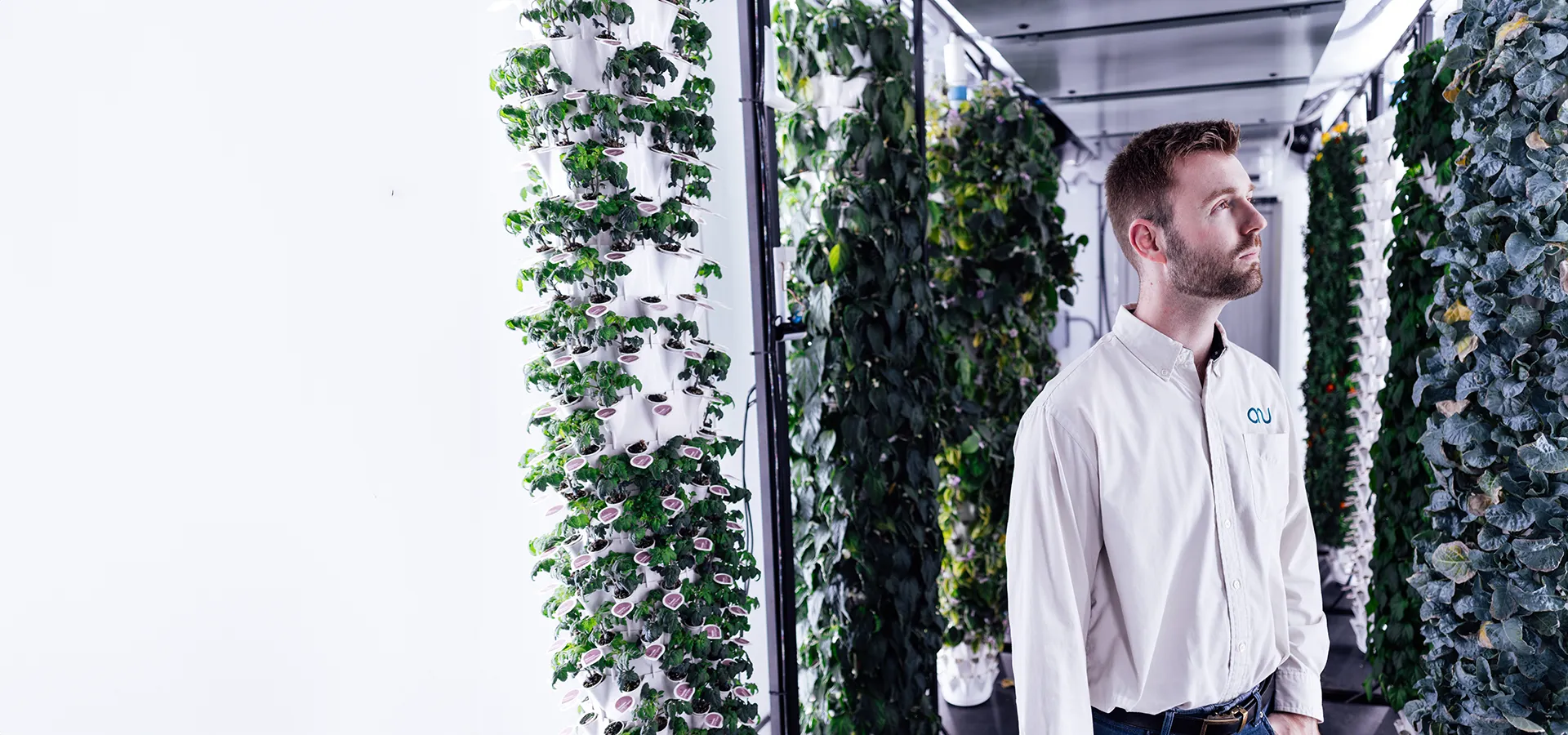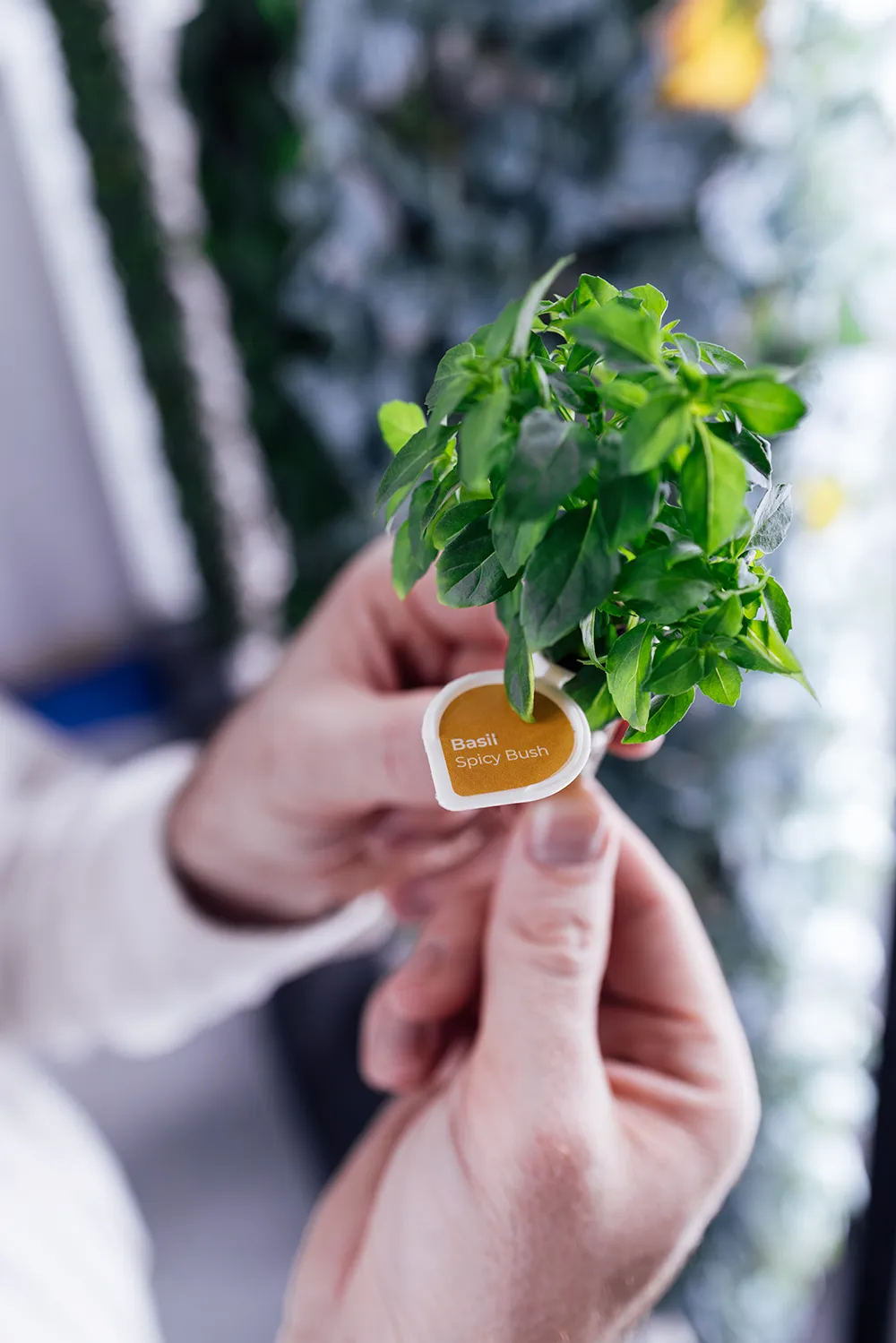
In the southern reaches of Indiana, where the climate begins to resemble Kentucky more than the Midwest, Anu™, a company co-founded by Scott Massey, has been quietly revolutionizing how we grow food.

The company Scott Massey (2017 BS in Mechanical Engineering Technology from Purdue Polytechnic Institute and a Purdue Certificate in Entrepreneurship and Innovation) and Ivan Ball started while students at Purdue represents the culmination of engineering expertise, entrepreneurial grit, and a mission to address one of humanity's most pressing challenges: sustainable food production in an era of diminishing resources and an epidemic of diet-related chronic-disease.

"Patent illustration was just this beautiful harmony between art describing something in its core functionality, but also protecting the design. It's as much a literary exercise as it is a drawing exercise."
Massey's journey toward agricultural innovation began with an unusual combination of skills. The son of an attorney and grandson of an engineering professor, Massey was drawn to both the legal and technical worlds. His mother, an artist, encouraged his creative pursuits from an early age, instilling an appreciation for design.
While studying mechanical engineering technology at Purdue, Massey secured an internship at Separation by Design, a company that designed oil equipment. There, he had a fortuitous opportunity to apprentice under the company's master draftsman, creating technical illustrations for patent applications.
"Patent illustration was just this beautiful harmony between art describing something in its core functionality, but also protecting the design," Massey explains. "It's as much a literary exercise as it is a drawing exercise."
This experience taught Massey how to distill complex ideas to their essential elements — a skill critical for both patent drafting and product design. A good patent, he learned, describes an invention in its "core essence, nothing unnecessary," while remaining "easily manufacturable, highly replicable, therefore difficult to work around." This understanding would later allow him to save money by drafting initial patent applications for his inventions.
The seeds for Anu were planted during Massey's junior year at Purdue when NASA recruited him for hydroponic cultivation chamber LED light spectrum research. Under the mentorship of renowned Purdue horticulturist Cary Mitchell, Massey worked on controlled environment agriculture systems designed for space exploration.
His research revealed a sobering reality: humanity confronts an unprecedented challenge to produce twice as much food with diminishing land and resources. When Massey asked if large-scale vertical farms might address this problem, Mitchell explained the difficulties — such operations needed to be highly efficient, use minimal energy and remain simple to operate.

This conversation sparked an idea. What if, instead of massive, centralized farms, they created a decentralized network of modular growth systems that could produce food at the point of consumption?
Massey pitched this concept to his NASA research colleague and future co-founder, Ball, an electrical and computer engineer, and drew parallels to the decentralization of ice factories to refrigerators producing perishable, water-based goods at the point of consumption.
The path from concept to prototype was arduous and financially precarious. In late 2016, with less than $5,000 to his name, Massey made a decisive investment in components for their first prototype and patent.
“I remember that moment of just sitting there and realizing this is a point of no return. It's either going to be a pretty painful learning experience, or we might be on the track of success.”
To fund development, Massey and Ball entered pitch competitions at Purdue and other universities, winning $5,000 in their first competition. When this proved insufficient to cover patent attorney fees, Massey took a job delivering newspapers for Purdue’s student newspaper, The Exponent. Having built rapport with The Exponent’s managing editor, he struck marketing gold. The editor published front-page articles about their competition wins, generating interest from potential customers.
The technology Massey and Ball developed — initially called the Gro Pod — is a self-contained cultivation system that grows food with minimal resources. Using hydroponic techniques, the system reduces water consumption by up to 98% compared to traditional agriculture by recirculating nutrient solution over plant roots rather than flooding entire fields without the need for pesticides or preservatives. Producing at the point of consumption further compounds these efficiencies, eliminating the need for overproduction in field-grown methods to offset perishability losses.
Their design incorporates rotary aeroponics, rotating plants around a vertical axis with stationary lights affixed to the sides. This innovative approach uses fewer lights, consuming less energy while producing less heat - crucial for growing heat-sensitive plants like tomatoes and peppers that require high light levels.
The Gro Pod system boasts high efficiency, autonomy, and the ability to cultivate a diverse range of crops. Initially focused on leafy greens and culinary herbs, the company has since expanded to fruiting plants with support from the USDA and other federal agencies — a significant advancement in decentralized food production.
"He's been working with teams along the way and picking up ideas and refining the business model, using the students as sets of hands for research to which he may not have access. A smaller company really can't afford the same level of access as Purdue."
- John Burr, Daniels School clinical associate professor of management
As Anu scaled up, Massey partnered with the Daniels School’s Office of Business Partnerships, which connects business owners with faculty. The office connected Massey to John Burr, a clinical associate professor who teaches strategic management and consulting. Burr’s Management 658 students scoped and tackled a market feasibility problem. This collaboration not only provided Massey with valuable insights and access to Purdue’s research resources but also gave students hands-on experience solving unstructured, authentic business problems. The partnership evolved to include further projects with Anu, exemplifying how alumni and local businesses can both benefit from and contribute to student learning, mentorship and professional development at Purdue.
Additionally, Massey worked with Purdue Ventures and the Daniels School’s undergraduate Integrated Business and Engineering (IBE) program.
“The go-to-market strategy developed through the IBE program's capstone projects, mentored by Matthew Lynall, has been invaluable. It effectively breaks down our education-market segments into a repeatable sales and marketing process. This procedural manual captures key strategic insights from the sales successes I've experienced while building my company and advocating for local food and nutritional sovereignty. As we scale our organization, these documented steps will be crucial for understanding the decision-making within our target education markets,” says Massey.
By the time Massey and Ball graduated in 2017, they had essentially pre-sold their first units through the newspaper articles that had generated interest. After spending the year perfecting their system, they began collecting deposits and selling their first units within eight months of graduation.
Each compostable seedpod comes with uncontaminated seeds and nutrients that provide multiple nutritious, antioxidant-laden servings.
Their earliest customers revealed an unexpected demographic: people with serious health concerns. Massey recalls customers sharing profound stories about diabetes and other health conditions that required dietary changes. "I met so many people that had health ailments either from themselves, a family member, a child, that had these intimate connections between food and health," he explains.

Each tower is capable of growing hundreds of plants by type – leafy greens, baby greens and vegetables, flowers, fruiting plants and herbs.
These early adopters were willing to spend $2,000 on an appliance from "two guys in a garage that had barely graduated college" because they saw the potential for consistent access to nutrition. Their feedback provided invaluable insights that shaped the company's future development and target market.
As the company evolved, Massey recognized the importance of brand identity. Their original name, Gro Pod, described the product but limited their vision. "That's like calling Apple 'iPhone,'" Massey explains.
They chose "Anu," inspired by the Celtic goddess of good harvest and fertility, to reflect their broader mission of "increasing nutrition access at the point of need to maximize health and wellness for both people and the planet." The name change signaled a shift from product-focused thinking to a mission-driven approach addressing global nutrition security.
Massey's approach to scaling mirrors the historical path of the dishwasher, which was invented by Josephine Cochrane in the late 1800s. Like Cochrane, who initially targeted consumers but found greater success in commercial markets of hotels and restaurants before establishing brand recognition before returning to consumer applications, Anu has shifted its focus to commercial clients like schools and hospitals that inspire student education with advanced AgTech STEAM careers and support Food as Medicine initiatives, respectively. Cochrane’s design ultimately became the standardized dishwasher model adopted by KitchenAid, a Whirlpool appliance line.
Each module can grow nearly 4,000 plants in the size of a parking space, with the possibility to double that with automated harvesting.
"We are now launching in the commercial market ... focusing holistically on what we call nurturing the body and mind," Massey explains. Schools provide an opportunity to intervene at a young age, teaching children what healthy food tastes like and potentially inspiring careers in sustainable agriculture. Hospitals benefit from the preventative health model that fresh, nutritious produce supports.
This commercial focus builds brand awareness while addressing nutrition insecurity more directly than the luxury consumer market could. It also provides a pathway to eventually reach a broader consumer base.
Today, Anu operates as three integrated businesses: hardware, software and consumables. The hardware — the physical cultivation system — is now manufactured through partnerships with companies like Eko Solutions, allowing Anu to focus on its core strengths.
The software component provides the intelligence that makes the system autonomous and easy to use, collecting data to optimize growing conditions across decentralized locations with its proprietary artificial intelligence algorithm.
The third component is a subscription-based seed pod service, similar to coffee pods but containing seeds, nutrients and the medium in which they grow. Unlike conventional coffee pods, Anu's pods are made from compostable plant-based resin derived from canola or corn, designed to degrade naturally without industrial processing. Most hydroponic systems require users to manage complex nutrient solutions or operate sophisticated sensing and dosing equipment — skills typically held by trained agronomists — making them inaccessible to the average person. Anu’s Self-Nurturing™ Seed Pods eliminate this barrier by embedding all essential nutrients directly into the pod, allowing anyone to simply plant and “Harvest When Hungry™” with no specialized knowledge required.
This integrated approach allows Anu to distribute "the means of production to produce locally rather than distributing produce, which is highly perishable," creating a sustainable system that addresses nutrition access while minimizing environmental impact.
With a growing team and partnerships with healthcare providers exploring "produce prescriptions" as preventative medicine to treat and reverse diet-related chronic disease, Anu is positioned to transform how we think about food production, nutrition access, and health — all from a seed planted in a Purdue University research lab led by its partners Scott Massey (CEO, Purdue ‘17), Ivan Ball (CTO, Purdue ‘17), and Dr. Sven Nelson (SVP of Research, Purdue ‘25).